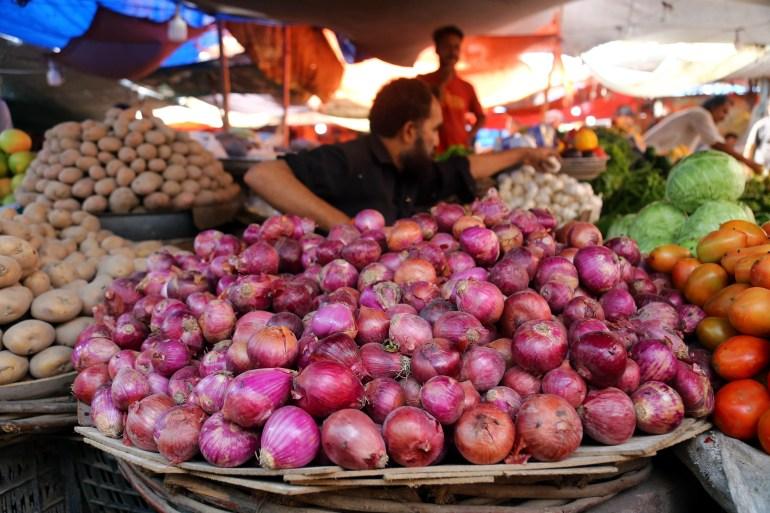Source: ALJAZEERA
ALJAZEERA MEDIA NETWORK

India's export ban on onions gave Pakistani exporters a rare opportunity to capitalize on the global market, significantly boosting their revenue.
Islamabad, Pakistan– Pakistani onion growers and traders are reveling in an unforeseen surge in exports over recent months, benefiting from the misfortune of their Indian counterparts.
The two South Asian nations, long-time adversaries, are also substantial onion producers. India is the second-largest onion exporter globally after China, dominating the market and often overshadowing smaller producing nations.
In December, when India implemented an export ban due to a drop in local production ahead of national elections, Pakistani farmers and exporters seized a rare opening. India had exported nearly 2.5 million tonnes of onions in 2023. The sudden market void enabled Pakistan to step in, exporting over 220,000 tonnes from December to March, surpassing their usual annual volume.
Waheed Ahmed, leader of the All Pakistan Fruit and Vegetable Exporters, Importers and Merchants Association (PFVA), credited this success to prompt action and government support. "When India imposed the ban, we urged our government to let us take advantage, and by acting swiftly, we earned over $200m for the country," Ahmed shared with Al Jazeera.
While Pakistan's government eventually restricted onion exports due to escalating domestic prices, ongoing exports from pre-approved deals are anticipated to bring an additional $50m by the end of the fiscal year in June. Typically, Pakistan earns $110m to $150m annually from onion exports. Last year, the total vegetable export earnings were over $235m, with onions contributing around $90m.
![Chef Hamid Baloch prepares chicken curry at his cafe in Islamabad [Abid Hussain/Al Jazeera]](https://nowtrends.net/storage/2024/06/BDFBFJQXJBSC_SBZSI9DP5LTJ.jpg) Chef Hamid Baloch prepares chicken curry at his cafe in Islamabad [Abid Hussain/Al Jazeera]
Chef Hamid Baloch prepares chicken curry at his cafe in Islamabad [Abid Hussain/Al Jazeera]
For an economically strained Pakistan, the export influx was a lifesaver for foreign reserves. Central bank data showed a recovery from $3bn last year to $9bn this month, covering six weeks of imports.
However, the domestic market suffered. Exporting over 220,000 tonnes of onions reduced local supply, causing prices to skyrocket from 50-80 rupees/kg to 250-350 rupees/kg between December and April, affecting ordinary citizens.
“Onions are essential in our daily meals," said Sumaira, a housemaid in Islamabad. "But with everything else becoming more expensive, rising onion prices added to the burden,” she added.
Hamid Baloch, a chef in Islamabad originally from Balochistan, noted the impact on his business, with the cost of a 5 kg onion bag rising from 1500-1800 rupees to about 500 rupees recently.
![Chef Hamid Baloch slices onions at his cafe in Islamabad. [Abid Hussain/Al Jazeera]](/wp-content/uploads/2024/05/hamid-baloch-G9-1716767126.jpg?w=770&resize=770%2C580)
Many Pakistanis, earning less than $3.5 a day according to the World Bank, struggled with the rising cost of living. Muhammad Azam, a daily wage worker, shared, “We can only eat chicken once every two months. Recently, even vegetables like onions were almost unaffordable.”
Government data and exporters agree that onion prices have decreased. Inflation dropped from a record high of over 38 percent last May to 11.8 percent in May 2024.
Imtiaz Hussain, a Karachi-based exporter, linked the price drop to India lifting its export ban in early May, which led Gulf and Far East markets to revert to Indian onions.
Ahmed mentioned that exporters used “good judgment and opportunism” to maximize exports during the government's brief allowance. "Our goal was to keep exporting without causing significant domestic shortages,” he stated.
He blamed retail price hikes on retailers exploiting the situation. "In wholesale markets, onions remained below 150 rupees/kg. Retailers selling above 300 rupees should be the government's concern, not ours," he clarified.
Ahmed viewed the opportunity as a balance after 2022 floods devastated crops. "This windfall helps farmers reinvest in the next crop. We need to train them in better agricultural practices to boost yields and profits." Ahmed concluded.
Your email address will not be published. Required fields are marked *